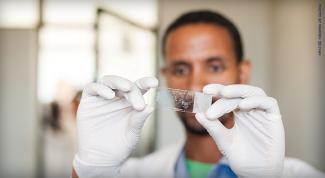Tuberculosis (TB) is one of several preventable diseases that remains a heavy burden in Ethiopia. The major causes of TB morbidity and mortality are a lack of access to early diagnosis and treatment services, co-infections with other infectious diseases such as HIV/AIDS and limited capacity to diagnose and manage multi-drug resistant (MDR) TB.
To combat TB in Ethiopia, USAID has been investing in increasing the availability of and demand for TB and MDR-TB prevention, care, and treatment services for many years and has contributed to the country’s progress towards eliminating the disease. As a result, TB deaths have dropped significantly as treatment success rates for TB patients are now over 90 percent, and 75 percent of those suffering from the deadly MDR-TB are now able to beat the disease after completing their medication regimens.
USAID is continuing to build upon this progress under our new Global TB Accelerator initiative. Ethiopia is one of 23 focus countries that we are partnering with to provide increased technical support and to strengthen local capacity to ultimately end TB. USAID also leverages public-private partnerships to expand access to better quality TB and MDR-TB services; has helped establish centers of excellence at national and regional levels to better detect and diagnose TB and MDR-TB; and helps ensure that patients are able to receive immediate care and begin treatment regimens to beat the disease.
KEY ACTIVITIES
- The USAID Eliminate TB from Ethiopia project focuses on strengthening laboratory detection and diagnostic capacity in health facilities, and expanding access to better quality TB care and treatment services, including medications, to help patients overcome the disease.
- The USAID Urban TB Local Organization Network project builds the capacity of local health facilities and care providers to enhance their quality of diagnosis and care for TB patients.
- The USAID Strengthening Resources for Technical Assistance (STAR) project builds the capacity of national TB program experts and leadership to contribute to a self-reliant program that will be able to lead and manage the national program with little or no external assistance.
- The Tuberculosis Accountability Framework Agreement (TIFA) project provides grants to the local government to initiate and maintain TB interventions through domestic resources.
KEY RESOURCES
- Fact Sheet: Tuberculosis Program in Ethiopia [PDF 282 KB]
- News: TB in Ethiopia Continues Impressive Decline Due to U.S. Assistance

